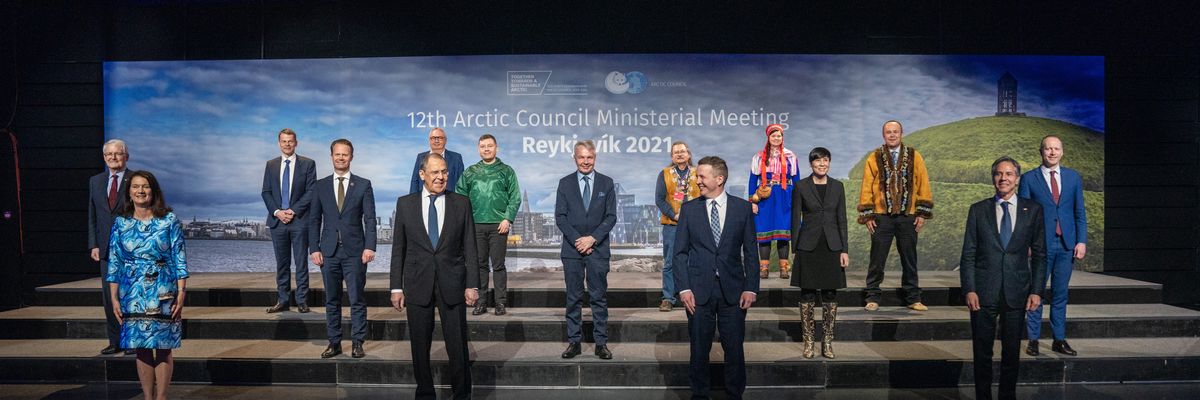Although it may be many miles away, echoes of Russia’s invasion of Ukraine have been felt as far north as the Arctic.
In March 2022, the Arctic 7 (Sweden, Iceland, Finland, Norway, Canada, Denmark, and the United States) released a statement announcing they would pause work of the Arctic Council in response to the invasion and more broadly Russia’s behavior on the world stage. While this pause may be understandable given the Arctic 7’s need to react to the war in Ukraine and Russia’s current chairmanship of the Council, it presents real concerns for the future of Arctic collaboration and security.
Although the Arctic 7 have indicated their wish to eventually restart the Council’s work — such as monitoring increasing microplastics and litter in the Arctic, reporting on climate change, and coordinating response exercises for emergency situations and increased Arctic shipping — this pause presents an important opening for rethinking Arctic cooperation, such as changing the Arctic Council’s funding structure and restructuring the Arctic Security Forces Roundtable to include Russia in a time of increasing tensions.
Arctic Council funding should be increased from member states to not just cover annual running costs but to fund projects that involve emergency preparedness and environmental monitoring — particularly as the impacts of climate change are felt even more starkly in the Arctic. Military-to-military communication is also needed in the region, whether that comes through restructuring the Arctic Security Forces Roundtable to include Russia or by creating a temporary forum that exists to ensure that miscalculation or error does not result in a wider conflict.
The Arctic Council is critical to Arctic cooperation
Since its inception in 1996, the Arctic Council has been critical for regional environmental cooperation and transparency. In addition to the Arctic 7 and Russia, there are a variety of other observer states, and it’s the only intergovernmental forum to include Indigenous People as permanent participants.
Not only has the Council kept the Arctic region stable and peaceful since the end of the Cold War, it has also played an important role in creating scientific reports on climate change and increasing communication in the region. For example, rather than having disparate regional institutions such as the Barents Euro-Arctic council that does not include all Arctic 8, the Arctic Council operates as a forum for all Arctic states and the Indigenous People living in the Arctic to communicate on questions of environmental disasters, sustainable development in the region, and broadly building rapport.
Through its working groups, the Council has shaped policy by cooperating, monitoring, and collecting long-term data sets of climate and environmental changes in the region, facilitating agreements on Arctic search and rescue, and addressing environmental damage in the Russian Arctic caused by the former Soviet Union.
But Russia is also critical to any Arctic institution
While Russia had increasingly become an unreliable partner on the world stage due in part to its invasion of Georgia in 2008, the annexation of Crimea in 2014, and now the invasion of Ukraine in 2022, it has largely been an important player in the Arctic as Russia makes up 50 percent of all Arctic landmass.
Russia has the strongest military capabilities in the Arctic and is both developing the Northern Sea Route as a commercial shipping passage as well as investing heavily in oil and gas extraction activities. In short, the Arctic Council wouldn’t work without including Russia. But Western states face a dilemma in seeking to address Russia’s illegal behavior while also including it in necessary talks. Returning to a business-as-usual approach gives the illusion that Russia will face no repercussions for its actions in Ukraine, but at the same time excluding Russia in Arctic cooperation is simply not feasible.
The Arctic 7 cannot wait for the war in Ukraine to end or abate to restart dialogue with Russia on Arctic issues, as the conflict doesn’t appear it will be over anytime soon. Increased shipping, resource extraction activity, heightened military exercises, and attention on the Arctic demand cooperation. Fortunately, military leaders from the Arctic 7 have suggested the pause in working with Russa on these issue is not going to go on forever.
While cooperation with Russia is on hold, there is time to rethink and reframe Arctic cooperation. For example, the Arctic Council is inadequately funded to address climate issues. Although it has enough annual funding from its member states, it has little money for discretionary issues and working groups rarely have ongoing funds for projects beyond an ad-hoc basis.
It should ask member states to contribute more to create greater buy-in for both the institution’s every day running and for longer term projects which could increase their will to cooperate on critical environmental questions. Greater funding will allow the Council to make a more serious impact on its projects, which includes monitoring and assessing the impacts of climate change in the region and emergency prevention and response. Questions of climate security — both considering the impact on Arctic residents as well as the safety of navigating the region — need funding for their solutions.
Second, although one of the Arctic Council’s strengths is that it does not address security or military issues — increasing Arctic tensions require more regional military-to-military communication and cooperation. While the Arctic Council may not be the place for such discussions, remodeling the existing Arctic Security Forces Roundtable to reinclude Russia after its expulsion in 2014 may offer one solution or even the creation of a temporary crisis-based communication structure that would work against regional miscommunication.
In an era of heightened tensions and global competition, particularly in the Arctic, such forums are needed to avert miscalculation. Climate change in the Arctic continues unabated, so taking this opportunity to create stronger structures to address this security risk has never been more important.














